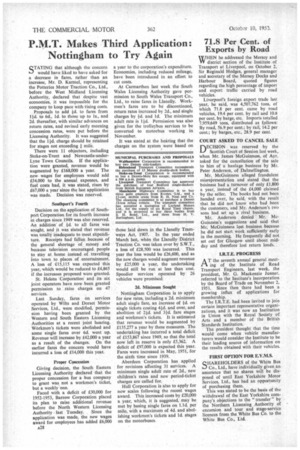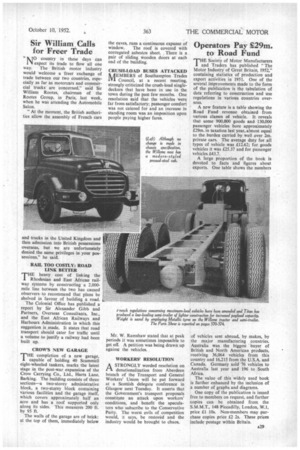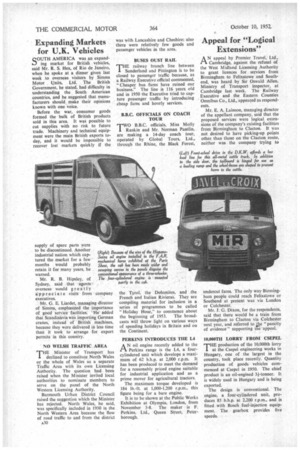P.M.T. Makes Third Application: Nottingham to Try Again
Page 30

Page 31

Page 32

If you've noticed an error in this article please click here to report it so we can fix it.
STATING that although the concern would have liked to have asked for a decrease in fares, rather than an increase, Mr. D. Karmel, representing the Potteries Motor Traction Co., Ltd., before the West Midland Licensing Authority, declared that despite vast economies, it was impossible for the company to keep pace with rising costs.
Proposals to add id. to fares from to 6d., Id. to those up to is., and 2d. thereafter, with similar advances on return rates, and revised early morning concession rates, were put before the Licensing Authority. It was suggested that the lid. charge should be retained for stages not exceeding mile.
There were 11 objectors, including Stoke-on-Trent and Newcastle-underLyne Town Councils. If the application were granted, revenue would be augmented by £168,000 a year. The new• wages for employees would add £54,000 to the annual expenses, and fuel costs had, it was stated, risen by £67,000 a year sincethe last application was made. Decision was reserved.
Southport's Fourth Decision on the application of Southport Corporation for its fourth increase in charges since 1949 was also reserved. An addition' of +cf. to all fares was sought, and it was stated that revenue was totally inadequate to meet expenditure. Receipts had fallen because of the general shortage of money and because television encouraged people to stay at home instead of travelling into town to places of entertainment. A loss of £15,115 was expected this year, which would be reduced to £4,865 if the increases proposed were granted, St. Helens Corporation and its six joint operators have now been granted permission to raise charges on 47 services.
Last Sunday, fares On services operated by Wilts and Dorset Motor Services, Ltd., were modified, permission having been granted by the Western and South Eastern Licensing Authorities at a recent joint hearing. Workmen's tickets were abolished and some single fares over 6d. went up. Revenue will increase by £42,000 a year as a result of the changes. On the earlier fares the concern would have incurred a loss of £14,000 this year.
Proper Concession Giving decision, the South Eastern Licensing Authority declared that the proper concession for a bus company to grant was not a workmen's ticket, but a weekly one.
Faced with a deficit of £30,000 for 1952-1953, Barrow Corporation placed its plan to raise additional revenue before the North Western Licensing Authority last Tuesday. Since the application was made, the new wages award for employees has added £6,000 A28 a year to the corporation's expenditure. Economies, including reduced mileage, have been introduced in an effort to cut costs.
At Carmarthen last week the South Wales Licensing Authority gave permission to South Wales Transport Co., Ltd., to raise fares in Llanelly. Workmen's fares are to be discontinued, return rates increased by 2d., and single charges by fd. and Id. The minimum adult rate is lid. Permission was also given for the trolleybus services to be Converted to motorbus working in November.
It was stated at the hearing that the charges on the system were based on those laid down in the Llanelly Tramways Act, 1907. In the year ended March last, when the Llanelly District Traction Co. was taken over by S.W.T., a loss of £28,500 was incurred. This year the loss would be £26,600, and as the new charges would augment revenue by £25,000 a year, the undertaking would still be run at less than cost. Speedier services operated by 26 vehicles were promised.
2d. Minimum Sought Nottingham Corporation is to apply for new rates, including a 2d. minimum adult single fare, an increase of id. on single tickets costing 41d. and over, and abolition of 2id. and 31d. fare stages and workmen's tickets. It is estimated that revenue would be augmented by £135,277 a year by these measures. The undertaking has incurred a total deficit of £153,867 since 1949, so that the total now left in reserve is only £5,362. A deficit of £97,000 is expected this year. Fares were increased in May, 1951, for the sixth time since 1939.
Aberdeen Corporation has applied for revisions affecting 31 services. A minimum single adult rate of 2d., new children's rates and new period-ticket charges are called for.
Hull Corporation is also to apply for new scales following the recent wages award. This increased costs by £20,000 a year, which, it is suggested, may be met by basing single fares on 1.1d. per mile, with a maximum of 4d. and abolishing workmen's tickets and Id. stages on the motorbuses.
71.8 Per Cent. of Exports by Road
WHEN he addressed the Mersey and VY district section of the Institute of Transport at Liverpool, on October 2, Sir Reginald Hodges. general manager and secretary of the Mersey Docks and Harbour Board, quoted figures regarding the high percentage of import and export traffic carried by road vehicles.
Liverpool's foreign export trade last year, he said, was 4,507,762 tons, of which 71.8 per cent. came by road vehicles, 19.4 per cent, by rail and 10.8 per cent, by barge, etc. Imports totalled 7,959,649 tons, distributed as follows: By road, 56.9 per cent.; by rail, 14.2 per cent.; by barges, etc., 28.9 per cent.
COURT ASKED TO CANCEL SALE nECISION was reserved by the
Scottish Court of Session last week, when Mr. James McGuinness, of Ayr. asked for the cancellation of the sale to him of a haulage business by Mr. Peter Anderson, of Dalmellington.
Mr., McGuinness alleged fraudulent misrepresentation and stated that the business had a turnover of only £1,800 a year, instead of the £4,000 claimed by the seller. The books had not been handed over, he said, with the result that he did not know who had been the customers, and Mr. Anderson's two sons had set up a rival business.
Mr. Anderson denied Mr. McGuinness's suggestions and said that Mr. McGuinness lost business because he did not start work sufficiently early in the morning. He frequently didnot set out for Glasgow until about midday and therefore lost return loads.
I.R.T.E. PROGRESS
A T the seventh annual general meet
ing of the Institute of Road Transport Engineers, last week, the president, Mr. G. Mackenzie Junner, referred to the Institute's incorporation by the Board of Trade on November 2, 1951. Since then there had been a growing influx of applications for membership. The I.R.T.E. had been invited to join certain important representative organizations, and it was now an Institution in Union with the Royal Society of Arts and a member of the British Standards Institution.
The president thought that the time would come when vehicle manufacturers would consider the Institute to be their leading source of information on the results obtained with their vehicles.
FIRST OPTION FOR E.Y.M.S.
QHAREHOLDERS of the White Bus
■ -) Co., Ltd., have individually given an assurance that no shares will be disposed of until East Yorkshire Motor Services, Ltd., has had an opportunity of purchasing them.
This was stated to be the basis of the withdrawal of the East Yorkshire company's objections to the " transfer " by the Northern Licensing Authority of excursion and tour and stage-service licences from the White Bus Co. to the White Bus Co., Ltd.
Sir William Calls for Freer Trade
NO country in these days can expect its trade to flow all one way. The British motor industry would welcome a freer exchange of trade between our two countries, especially as far as motorcars and commercial trucks are concerned," said Sir William Rootes, chairman of the Rootes Group, in Paris, last week, when he was attending the Automobile Salon.
"At the moment, the British authorities allow the assembly of French cars RAIL TOO COSTLY: ROAD LINK BETTER
THE heavy cost of linking the Rhodesian and -East African railway systems by constructing a 2,000mile line between the two has caused observers to recommend that plans be shelved in -favour of building a road.
The Colonial Office has published a report by Sir Alexander Gibb and Partners, Overseas Consultants, Inc., and the East African Railways and Harbours Administration in which this suggestion is made. It states that road transport should cater for traffic until a volume to justify a railway had been built up.
CROW'S NEW GARAGE
THE completion of a new garage, capable of holding 40 Scammell eight-wheeled tankers, marks the latest stage in the post-war expansion of the Crow Carrying Co., Ltd., Harts Lane. Barking. The building consists of three sections—a two-storey administrative block, a two-storey block containing various facilities and the garage itself, which covers approximately half an acre and has a roof supported only along its sides. This measures 200 ft. by 95 ft.
The walls of the garage are of brick: at the top of them, immediately below the eaves, runs a continuous expanse of window. The roof is covered with corrugated asbestos sheet. There is a pair of sliding wooden doors at each end of the building.
CRUSH-LOAD BUSES ATTACKED
MEMBERS of Southampton Trades Council, at a recent meeting, strongly criticized the crush-load singledeckers that have been in use in the town during the past few months. One resolution said that the vehicles were far from satisfactory; passenger comfort was not catered for and an increase in standing room was an imposition upon people paying higher fares.
Mr, W. Ramshaw stated that at peak periods it was sometimes impossible to get off. A petition was being drawn up against the vehicles.
WORKERS' RESOLUTION
ASTRONGLY worded resolution on denationalization from Aberdeen branch of the Transport and General Workers' Union will be put forward at a Scottish delegate conference in Glasgow next Tuesday. It asserts that the Government's transport proposals constitute an attack upon workers' conditions, and benefit the speculators who subscribe to the Conservative Party. The worst evils of competition would, it says, be restored and the industry would be brought to chaos.
Operators Fay £29m. to Road Fund
THE Society of Motor Manufacturers and Traders has published "The Motor Industry of Great Britain, 1952," containing statistics of production and export activities in 1951. One of the several improvements made to the form of the publication is the tabulation of data referring to construction and use regulations in various countries overseas.
A new feature is a table showing the Road Fund revenue obtained from various classes of vehicle. It reveals that some 900,000 goods and 130,000 passenger vehicles bore approximately £29m. in taxation last year, almost equal to the burden carried by well over 2m. private cars. The average duty for all types of vehicle was £12.62; for goods vehicles it was £25.37 and for passenger vehicles £43.7.
A large proportion of the book is devoted to facts and figures about exports. One table shows the numbers of vehicles sent abroad, by makes, by the major manufacturing countries. Australia was the biggest buyer of British and North American products, receiving 36,064 vehicles from this country and 16,215 from the U.S.A. and Canada. Germany sold 76 vehicles to Australia last year and 196 to South Africa.
The value of this widely used book is further enhanced by the inclusion of a number of graphs and diagrams.
One copy of the publication is issued free to members on request, and further copies can be obtained from the S.M.M.T., 148 Piccadilly, London, W.1, price £1 10s. Non-members may purchase copies price £2 2s. These prices include postage within Britain.
Expanding Markets for U.K. Vehicles
QOUTH AMERICA was an expand ing market for British vehicles, said Mr. R. S. Hex, of Rio de Janeiro, when he spoke at a dinner given last week to overseas visitors by Simms Motor Units, Ltd. The British Government, he stated, had difficulty in understanding the South American countries, and he suggested that manufacturers should make their opinions known with one voice.
Before the war, consumer goods formed the bulk of British products sold in this area. It was possible to cut supplies with no risk to future trade. Machinery and technical equipment were the main British exports today, and it would be impossible to recover lost markets quickly if the supply of spare parts were to be discontinued. Another industrial nation which captured the market for a few months would probably retain it for many years, he warned.
Mr. R. B. Hipsley, of Sydney, said that agents overseas would grea t 1 y appreciate visits from executives.
Mr. G. E. Liardet, managing director of Simms, emphasized the importance of good service facilities. He added that Scandinavia was importing German cranes, instead of British machines, because they were delivered in less time than it took to arrange for export permits in this country.
NO WELSH TRAFFIC AREA
THE Minister of Transport has declined to constitute North Wales or the whole of Wales as a separate Traffic Area with its own Licensing Authority. The question had been raised when the Minister invited local authorities to nominate members to serve on the panel of the North Western Licensing Authority.
Barmouth Urban District Council raised the suggestion which the Minister has rejected. North Wales, he said, was specifically included in 1930 in the North Western Area because the flow of road traffic to and from the district A30 was with Lancashire and Cheshire: also there were relatively few goods and passenger vehicles in the area.
BUSES OUST RAIL
THE railway branch line between Sunderland and Pittington is to be closed to passenger traffic because, as a Railway Executive official commented, "Cheaper bus fares have ruined our business." The line is 116 years old and in 1950 the Executive tried to capture passenger traffic by introducing cheap fares and hourly services.
B.B.C. OFFICIALS ON COACH TOUR
TWO B.B.C. officials, Miss Molly Rankin and Mr. Norman Pantlin, are making a 14-day coach tour, operated by Global Tours, Ltd., through the Rhine, the Black Forest,
the Tyrol, the Dolomites, and the French and Italian Rivieras. They are compiling material for inclusion in a series of programmes to be called "Holiday Hour," to commence about
the beginning of 1953. The broadcasts will throw light on various ways of spending holidays in Britain and on the Continent.
PERKINS INTRODUCES THE L4
AN oil engine recently added to the Perkins range is the L4, a fourcylindered unit which develops a maximum of 62 b.h.p. at 2,000 r.p.m. It has been produced to meet the demand for a reasonably priced engine suitable for industrial application and as a prime mover for agricultural tractors.
The maximum torque developed is 184 lb.-ft. at 1,000-1,200 r.p.m., this figure being for a bare engine.
It is to be shown at the Public Works Exhibition at Olympia, London, from November 3-8. The maker is F. Perkins, Ltd., Queen Street, Peterborough.
Appeal for "Logical Extensions"
AN appeal by Premier Travel, Ltd., Cambridge, against the refusal of the West Midland Licensing Authority to grant licences for services from Birmingham to Felixstowe and Southend, was heard by Sir Oswald Allen, Ministry of Transport inspector, at Cambridge last week. The Railway Executive and the Eastern Counties
• Omnibus Co., Ltd., appeared as respondents.
Mr. E. A. Lainson, managing director of the appellant company, said that the proposed services were logical extensions of the company's existing facilities from Birmingham to Clacton. It was not desired to have picking-up points other. than those on the Clacton route, neither was the company trying to undercut fares. The only way Birmingham people could reach Felixstowe or Southend at present was via London or Colchester.
Mr. J. G. Dixon, for the respondents, said that there would be a train from Birmingham to Clacton via Colchester next year, and referred to the "paucity of evidence" supporting the •appeal.
10,000TH LORRY FROM CSEPEL
THE production of the 10,000th lorry at the Csepel engineering works in Hungary, one of the largest in the country, took place recently. Quantity production of goods vehicles commenced at Csepel in 1950. The chief product is an oil-engined 34-tonner. It is widely used in Hungary and is being exported.
The design is conventional. The engine, a four-cylindered unit, produces 85 b.h.p. at 2,200 r.p.m., and is fitted with Bosch fuel-injection equipment. The gearbox provides five speeds.












































































